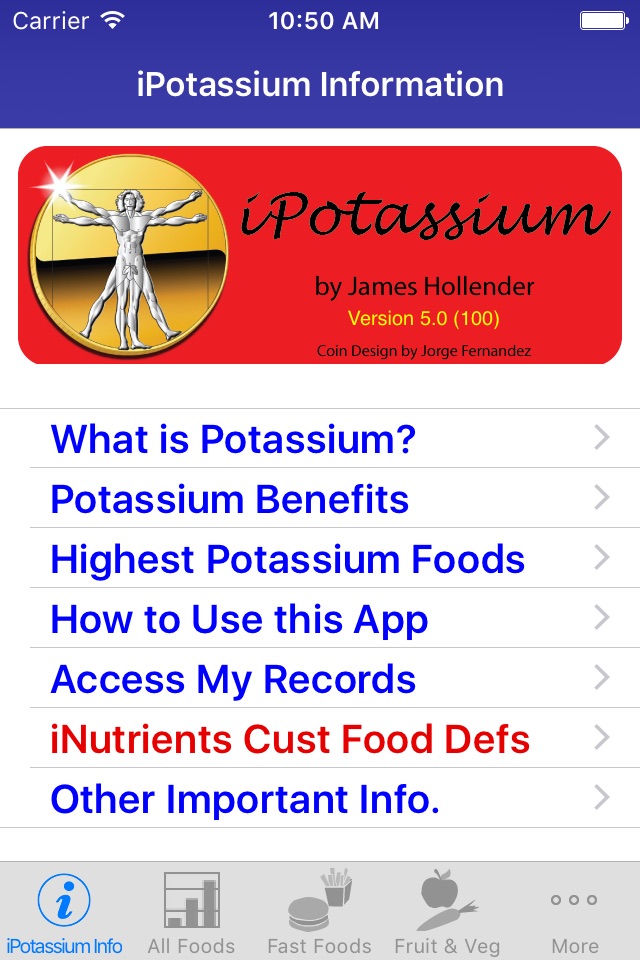
The nutrient Potassium can help with: Anxiety & Stress; Blood Pressure; Brain Function; Cramps; Regulating Electrolytes; Heart & Kidney Disorders; Low Blood Sugar; Metabolism; Muscle Disorders; Muscular Strength; Nervous System; Preventing Stroke; and Water Balance.
iPotassium is one of 10 iNutrient apps based on the USDA National Nutrient Database. The others include:
- iCarbs (Carbohydrates)
- iCholesterol (Dietary Cholesterol)
- iFiber (Fiber)
- iKals (Calories)
- iProteins (Proteins)
- iSatFat (Saturated Fat)
- iSodium (Sodium)
- iSugars (Sugars)
- Vitamin K (Vitamins K1, K1D & K2)
If you are working towards healthy eating, knowing the amount of potassium in the foods available for consumption can be extremely helpful.
The iPotassium app provides information about foods and how they are rated for content of potassium. This is provided as a means to assist in deciding which foods to eat. The food servings are rated from EXTREMELY LOW in potassium all the way up to EXTREMELY HIGH. The following colors help readily identify which is which:
- Black = Rated EXTREMELY HIGH in Potassium (> 700 mg)
- Dark Red = Rated VERY HIGH in Potassium (501 - 700 mg)
- Red = Rated HIGH in Potassium (351 - 500 mg)
- Orange = Rated MODERATELY HIGH in Potassium (201 - 350 mg)
- Yellow = Rated MODERATE in Potassium (151 - 200 mg)
- Light Green = Rated MODERATELY LOW in Potassium (101 - 150 mg)
- Green = Rated LOW in Potassium (51 - 100 mg)
- Cyan = Rated VERY LOW in Potassium (11 - 50 mg)
- White = Rated EXTREMELY LOW in Potassium (0 - 10 mg)
Essentially, the cooler the color, the lower the amount of Potassium, with white being the coolest color and black being the hottest (think burnt).
There are eight tables listing food servings:
- All Foods
- Fast Foods
- Fruits & Vegetables
- Meat, Fish & Shellfish
- Dairy & Egg
- Cereal Grains & Pasta
- Sweets
- Snacks
Users can record their intake for any food. The information is maintained for one year and is presented in reverse chronological order grouped by day, so the latest data is presented first in the list. Editing allows for: 1) changing the number of servings; 2) changing the date; and 3) deleting records. Individual Intake Items can be copied to the current day, and all Intake Items for a single day can be copied to the current day.
Selecting a food in any of the tables will display pertinent information about the selected food serving:
- Food Title
- Weight (in grams)
- Common Measure (serving size for weight)
- Potassium Content (in milligrams)
- Calories
- USDA Description
- USDA Food Group
- USDA Nutrient Database Number
Information is derived from the USDA National Nutrient Database for Standard Reference: Potassium Content of Selected Foods per Common Measure. There are currently over 1,100 different food servings included, searchable using more than 2,500 names (some foods are known by different names or how they are prepared, e.g., "Egg, Scrambled" and "Scrambled Egg"). A few these have as many as six searchable names.
The Potassium Info screen provides access to additional information pages:
- What is Potassium?
- Benefits of Potassium
- Highest Potassium Foods
- How to Use this App
- Access My Records
- iNutrients Custom Food Definitions (another app with more features and data for 10 nutrients)
- Important Other Info. (includes allowance to 1) Report a Problem; 2) Ask a Questions; and 3) Make a Suggestion)



